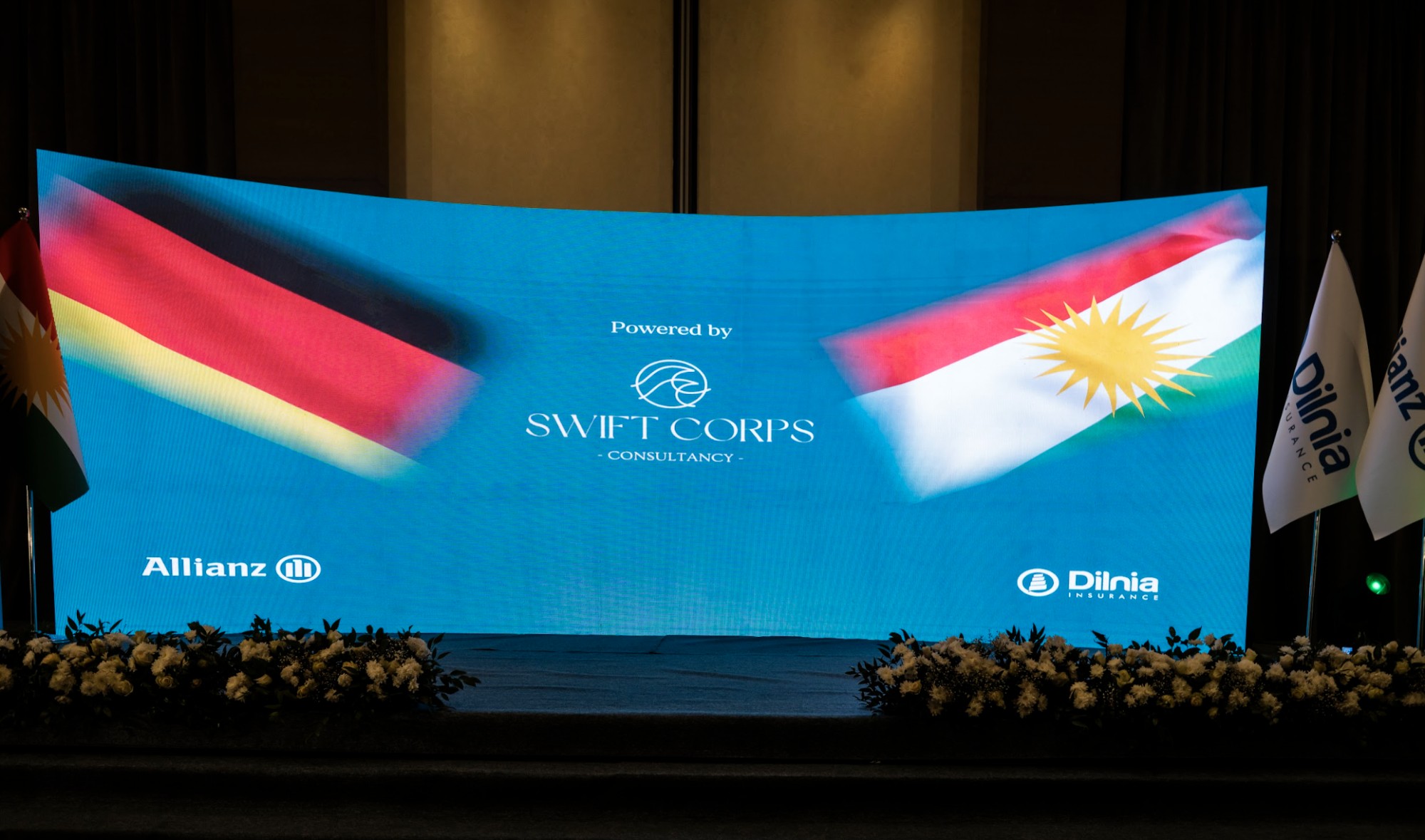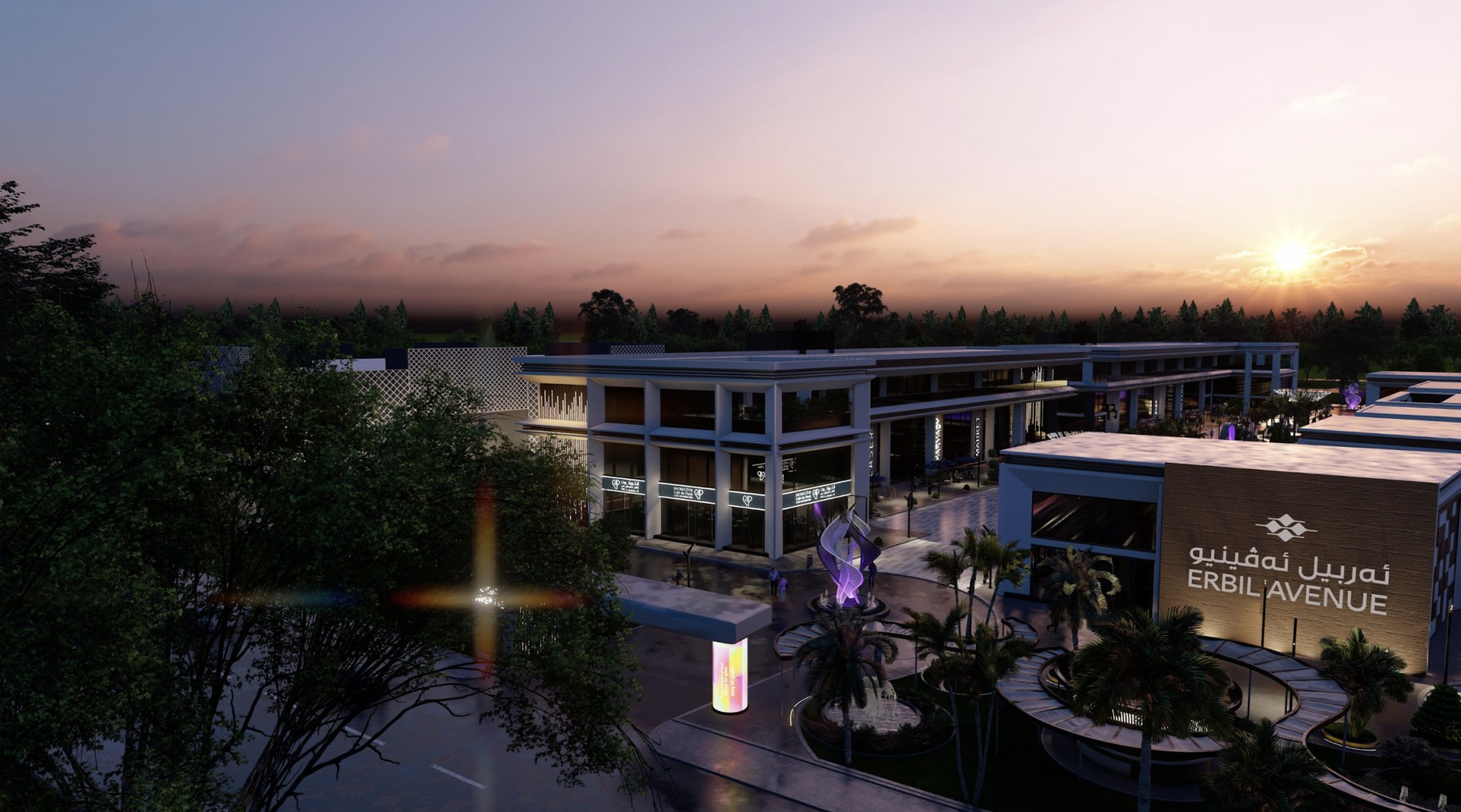With a history marked by security crises, economic hardships, societal challenges, and most recently, the worsening effects of climate change, Iraq refuses to give up. Baptized by fire, young Iraqis have inherited a resilient spirit from their parents coupled with their strong aspiration for a better future. This aspiration is clearly reflected in a recent report by the British Council titled Next Generation Iraq, which suggests that the youth in Iraq cling to high hopes for their future.
What is Next Generation?
Next Generation is a global research initiative by the British Council that studies the current challenges faced by young people and how they can be supported to play an active role in their societies. Young people’s views on certain topics – including but not limited to education, employment, and living standards – are defined as the main topics in focus.
To discuss the program in depth, Kurdistan Chronicle sat down with Christine Wilson, Director of Research and Insight at the British Council. She explained that, since 2009, the council has undertaken research in over 20 countries and engaged over 50,000 young people around the world in countries including Colombia, Nigeria, Vietnam, Germany, Pakistan, Lebanon, and the UK.

“And now Iraq has joined the Next Generation family,” Wilson said. “Iraq has one of the most youthful populations on the planet, with nearly 60% under the age of 25. Their lives have been marked by near constant upheaval and challenge.”
“We started this research 20 years after the U.S.-led invasion of Iraq, and are publishing it five years on from the Tishreen Movement. It was natural for us to engage with Iraqi youth, working with local and international research partners, to listen to their aspirations for themselves and their country, and to understand the role they want to play to achieve them. We also ask about the challenges and barriers they face and explore the varied policy responses to address them,” she explained.
Next Generation Iraq
Through consultations with 1,300 young people aged 18-30 from diverse backgrounds, Next Generation Iraq aims to understand youth attitudes and aspirations, amplify their voices, and support policymaking that reflects the hopes and desires of young people.
Asked about the role of tradition in Iraq’s society, Wilson explained that the research findings reveal that, while Iraq is indeed marked by traditional views, there is a growing desire among young people to aspire for more progressive changes.
“The research highlights how youth, particularly in urban areas, are eager to engage with issues like equality, civic participation, and economic reforms, despite the resistance they may face from more conservative elements in their communities. By engaging in dialogue, advocating for policy engagement, and participating in decision-making processes, these young individuals are working toward a future where tradition and progress can coexist,” Wilson elaborated. “Our work in Erbil and Duhok has particularly demonstrated these dynamics, with youth across the Kurdistan Region expressing their desire for increased opportunities to engage in the policy and reform processes.”
Research findings
Balancing traditional values and modern life: Defined by a collectivist culture, family is a traditional value of Iraqi society and remains a central aspect of many young Iraqi’s lives. Nearly two-thirds of young people (63%) cite family as the biggest influence on their views, and almost three-quarters (73%) consider family members the most trusted sources of information. In line with this, having a family and stable relationship is a key goal for most young Iraqis. Over two-thirds (66%) pointed to family-related factors as pivotal to their personal success and happiness.
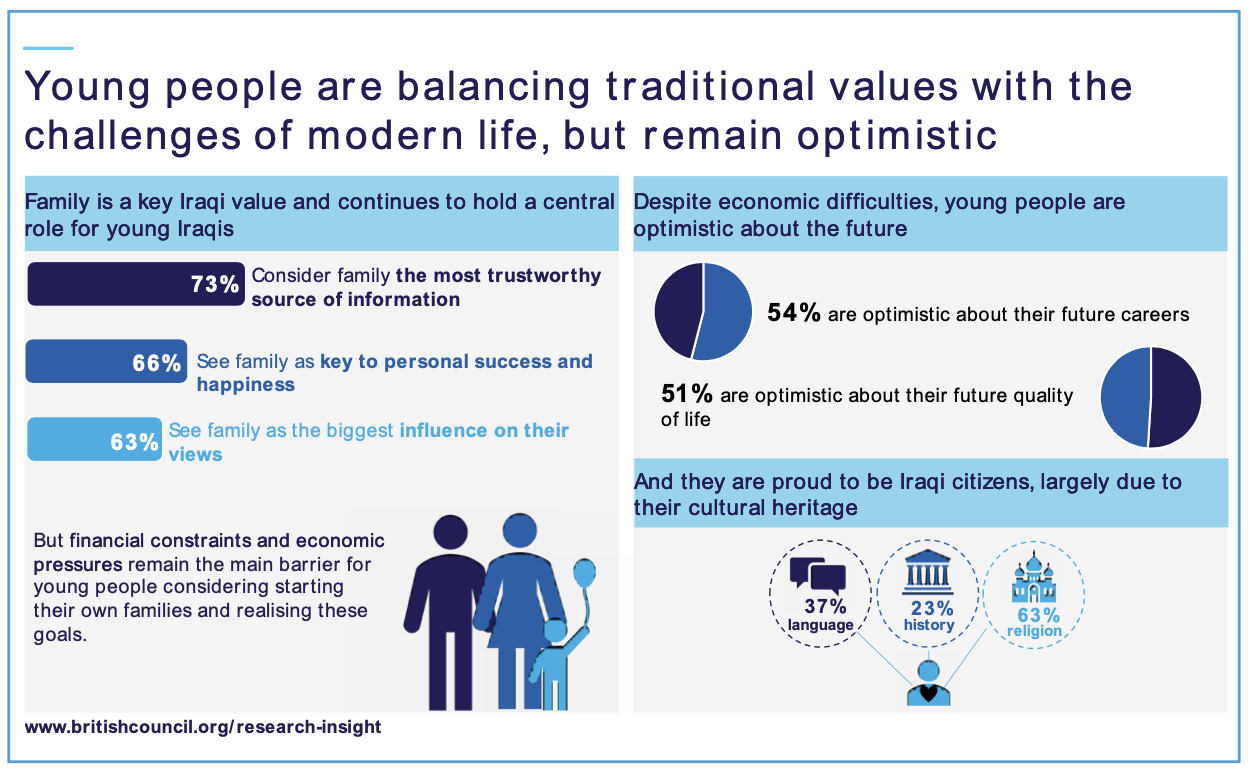
Education as key to societal change: Iraq’s education sector has also been severely impacted by conflict, displacement, and the Covid-19 pandemic, resulting in damaged infrastructure, low teacher training investment, and disrupted learning processes. The educational system’s focus on theoretical knowledge and exam grades, rather than practical skills and student interests, inadequately prepares students for the labor market. Improvements in the curriculum (23%) and the quality of teaching (29%) are seen as key by young people. Addressing these issues requires systemic reforms to enhance the quality and relevance of education to better align with market demands.
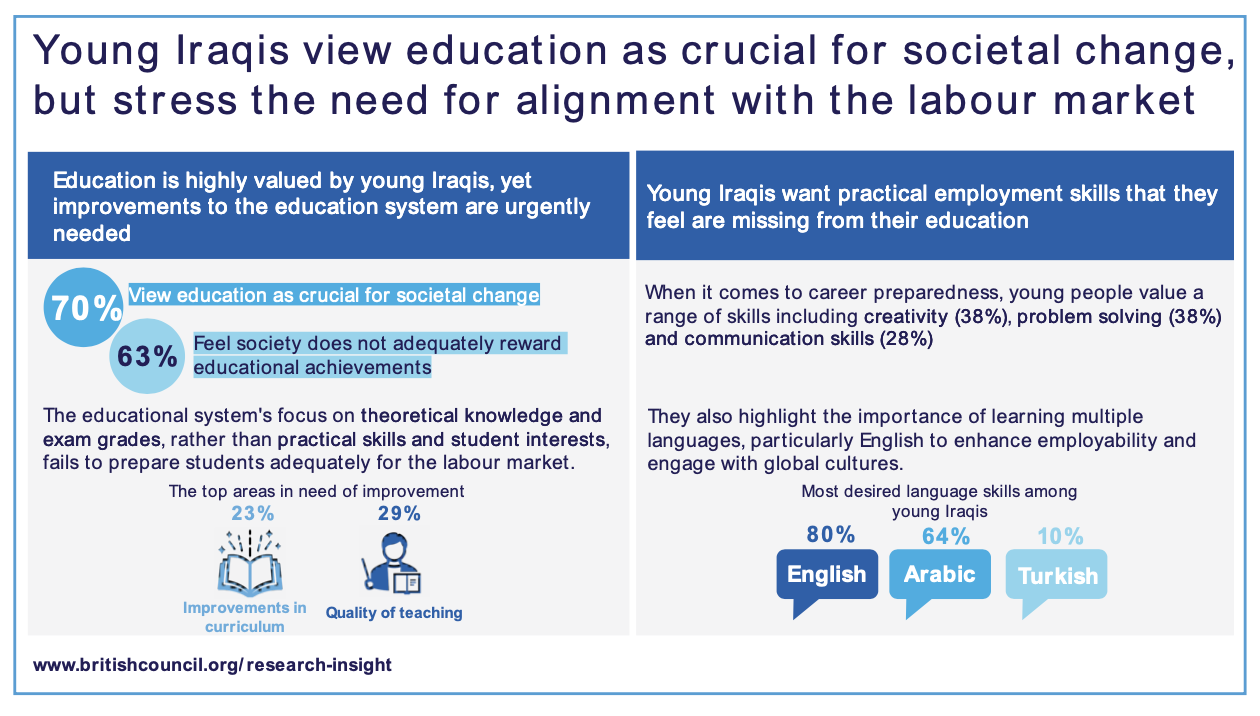
Unemployment remains a key challenge: Almost three in ten young people (28%) reported currently being unemployed, largely in line with recent 2023 statistics from the World Bank placing youth unemployment at 32%. Young men are significantly more likely to be in paid employment than young women, who are far more likely to be homemakers, especially in rural areas. The pressing need for more employment opportunities – which 52% of young people identify as their biggest challenge – is exacerbated by corruption and nepotism within the state apparatus. Many young Iraqis perceive public sector jobs as inaccessible without connections, while competition for private sector jobs remains intense.
However, young people are seeking out alternatives to traditional employment, with six out of ten respondents (60%) expressing an interest in entrepreneurship, viewing it as a solution to the need for more employment opportunities in the labor market and an alternative pathway to self-sufficiency. Promisingly, entrepreneurship presents a key opportunity to include women in the workforce as there is equal appetite for entrepreneurship among both young men and women. Additionally, 59% of disabled young people express an appetite for entrepreneurship, viewing it as an alternative employment pathway that accommodates their condition.
Urban residents (62%) show a higher interest in entrepreneurship compared to their rural counterparts (52%), with those in the Kurdistan Region (76%) being particularly keen on starting a business compared to those in north or western Iraq (46%).

Increasing desire to emigrate: Young people see emigration as vital for personal and academic development, broadening perspectives, opportunities, and allowing cross-sharing of cultures. Just under half (48%) of young Iraqis would consider moving abroad, with young people from the Kurdistan Region more open to relocation than those in north and western Iraq. This is a marked increase from previous years, with only two in ten young Iraqis reportedly thinking about emigrating from Iraq in a British Council survey of MENA youth in 2020.
Climate concerns overshadowed by daily challenges: Unemployment (45%), poverty (48%), and extremism and violence (32%) remained significant global concerns among young Iraqis, stemming from reflections on security issues faced by previous generations in Iraq and discussions about their own futures. There is a clear urban and rural divide on perspectives on global challenges, with urban residents more likely to identify a broader range of global issues, including drug abuse and the drug trade, health crises and pandemics, and erosion of religious values, compared to their rural counterparts.

Disillusioned with the political process: Half of Iraqi youth (50%) believe it is important to engage in national politics, but this varies by region. This aligns with views on climate change mitigation, where young people thought that national (27%) and local governments (20%) should be responsible for action. Among those interested in politics, 20% want their views reflected in political discussions. However, almost four in ten (39%) do not plan to increase their political involvement, something which relates to a disillusionment with the political process.
Young people recognize the importance of being politically engaged but are skeptical about the electoral process due to perceptions of unfulfilled promises and systemic issues. In response to this, protest and social media are seen as powerful ways for Iraqi youth to voice concerns and mobilize for change, but some young people hold reservations regarding their security and safety expressing their views online.
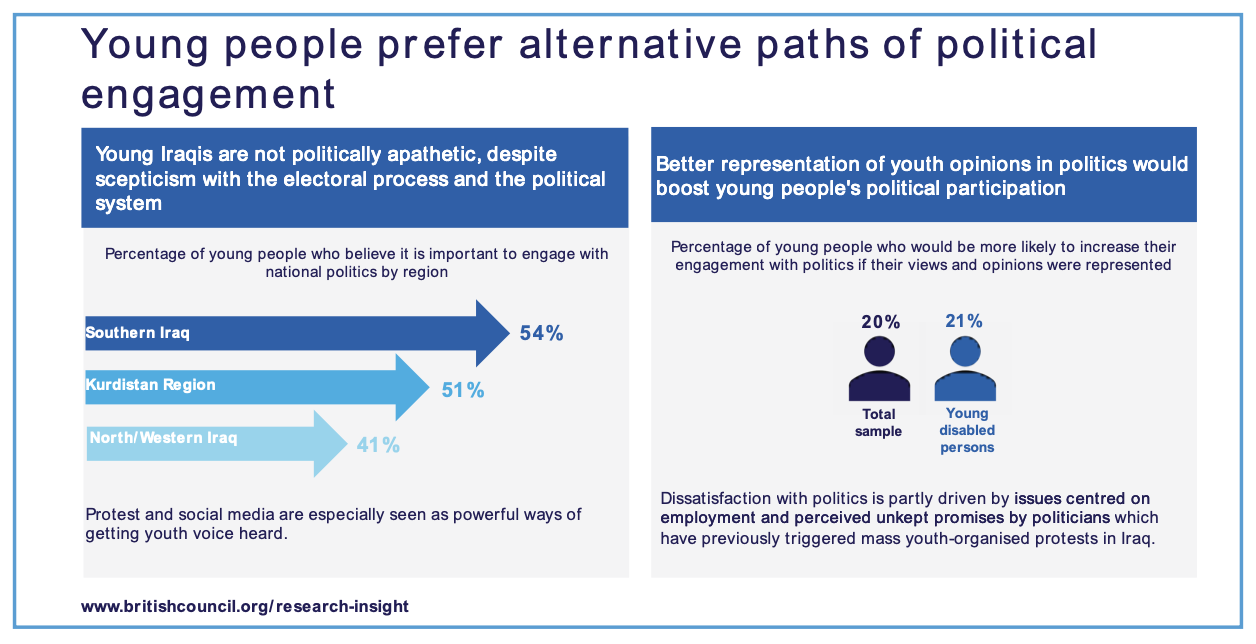
Making the desired impact
Asked about the impact that the Next Generation program hopes to make in the long run on both the youth and policymakers, Wilson said that the initiative envisions fostering a more inclusive, empowered generation of youth who are equipped to lead their communities and engage meaningfully with policymakers.
“For the youth, we aim to build their leadership and critical thinking skills, ensuring they become leaders of change in areas like governance, equality, and economic development. For policymakers, the goal is to shift perspectives on youth engagement and to encourage the adoption of policies that reflect the needs and aspirations of this younger generation.”
Commenting on the desired impact of the program on the Kurdistan Region specifically, Wilson stressed that, by continuing to create platforms for constructive dialogue and collaboration between youth and decision-makers across the Kurdistan Region of Iraq, including in Erbil, Sulaymaniyah, Duhok, and soon Halabja, the Next Generation initiative seeks to promote more youth-centered policies, particularly in areas that are critical to Iraq’s development, such as education, employment, and social cohesion.
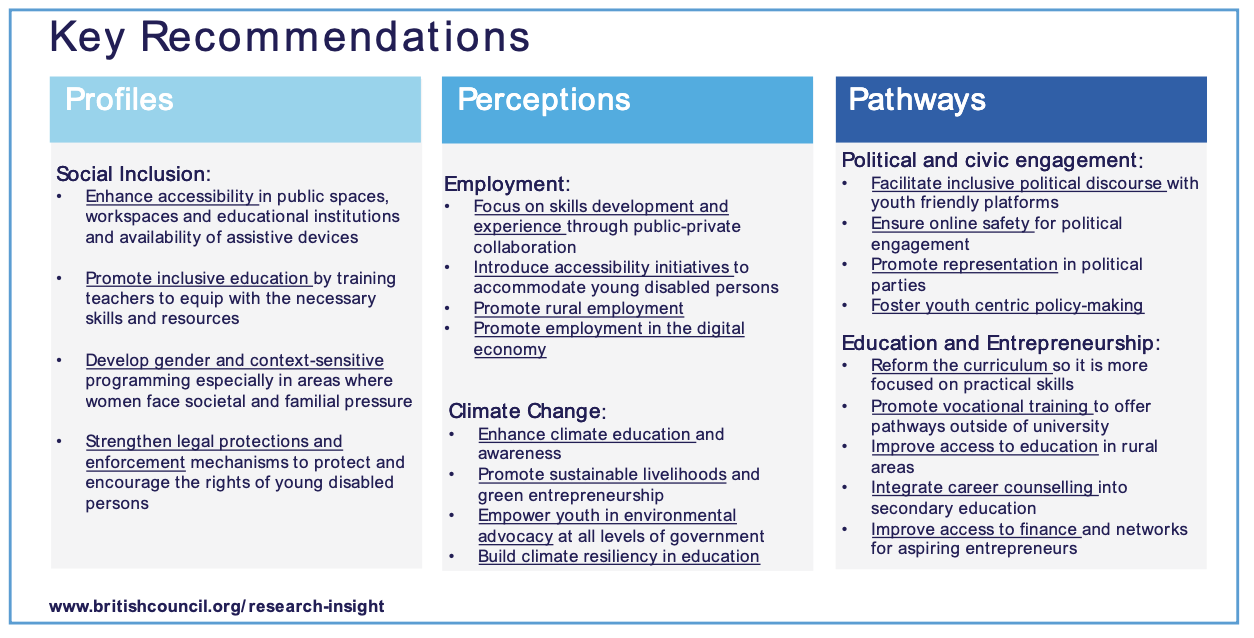
Sardar Sattar is a translator and journalist based in the Kurdistan Region. He has an MA in English Studies from the University of Lodz, Poland. He has translated several books and political literature into Kurdish and English. He writes regularly for local and international newspapers and journals.
